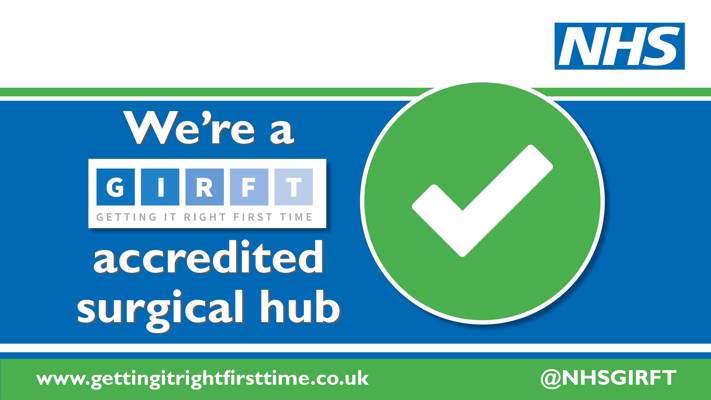GIRFT Elective Surgical Hub
The Robert Jones and Agnes Hunt Orthopaedic Hospital has been successfully accredited as an elective surgical hub delivering high standards in clinical and operational practice. The Trust has been accredited both for its adult services and for its paediatric services - it is one of the very first organisations in the country to get the kitemark for paediatrics.
The scheme, run by NHS England’s Getting It Right First Time (GIRFT) programme in collaboration with the Royal College of Surgeons of England, assesses hubs against a framework of standards to help hubs deliver faster access to some of the most common surgical procedures such as cataract surgeries and hip replacements. It also seeks to assure patients about the high standards of clinical care.
Surgical hubs, which are separated from emergency services, are part of plans nationally to increase capacity for elective care with more dedicated operating theatres and beds.
The hubs exclusively perform planned surgery and mainly focus on high volume, low complexity (HVLC) surgery across six specialties - ophthalmology, general surgery, orthopaedics, gynaecology, ear nose and throat, and urology.
Hubs bring together the skills and expertise of staff under one roof, with protected facilities and theatres, helping to deliver shorter waits for surgery. Because they are separated from emergency services, their surgical beds can be kept free for patients waiting for planned operations, reducing the risk of short-notice cancellations.
We were visited and assessed in November 2023 by the GIRFT team for accreditation and recognition that the hub is working to a defined set of clinical and operational standards on:
- The patient pathway
- Staff and training
- Clinical governance and outcomes
- Facilities and ring-fencing
- Utilisation and productivity
RJAH is one of 31 hubs to date that have been accredited. There are around 94 hub sites currently in operation in England and the scheme is being rolled out nationally with quarterly cohorts to accredit all hubs over the next two years. While it is not mandatory for trusts to seek accreditation, the long-term goal is for every elective hub to be accredited.
Professor Tim Briggs, Chair of GIRFT and NHS England’s National Director for Clinical Improvement and Elective Recovery, said: “We have been impressed with the professionalism and enthusiasm of the hub teams who are delivering outstanding care.
“All of the sites we accredited are focused on delivering safe and high-quality care, and an excellent patient experience. GIRFT’s focus is on developing surgical hubs with the aim of improving patient flow so that patients have shorter waits for surgery and, for some procedures, will be more likely to be able to go home on the same day.”
Background notes on GIRFT:
The accreditation scheme is a collaboration with the Royal College of Surgeons of England and is also supported by the Royal College of Anaesthetists.
GIRFT is a national NHS England programme which gathers and collates clinical data. It helps trusts and integrated care systems to benchmark and review their performance across a range of metrics and different specialty procedures.
A priority area is to drive improvement in six high-volume but low complexity surgical specialties:
- Ophthalmology
- General surgery
- Trauma and orthopaedics (including spinal surgery)
- Gynaecology
- ENT
- Urology
As part of this, GIRFT is supporting systems to ring-fence elective capacity and create elective hub facilities to carry out low and medium complexity procedures at scale within defined standards. These hub sites will help increase elective activity with patient flows into the hubs from a number of different trusts or trust sites within a system.
Some hubs were set up during the COVID-19 pandemic in order to provide protected facilities for planned surgical care and have now evolved into permanent facilities supporting the recovery of elective services.
